Whether you’re a morning person or can barely drag yourself out of bed, everyone knows how important a good night’s sleep can be.
Now, scientists have revealed which countries are getting the most rest.
According to a study of 50,000 people in 20 different countries, the UK is the world’s fifth sleepiest nation – getting an average of seven hours and 33 minutes each night.
But it is France that claims the top spot as the world’s most rested nation, with the average French citizen snoozing for seven hours and 52 minutes.
At the bottom of the sleeping league table is Japan, where the average person dozes for just six hours and 17 minutes.
That means the average Japanese citizen gets over an hour and a half less sleep than their French counterpart – translating to a more than 40-hour difference in a month.
However, while missing out on sleep can lead to a number of health problems, the researchers found that countries where people got less sleep weren’t any less healthy.
Senior author Professor Steven Heine, of the University of British Columbia, says: ‘There is no one-size-fits-all amount of sleep that works for everyone.’

Scientists have revealed which countries are getting the most sleep every night, and the UK only comes in at fifth with seven hours and 33 minutes each night (stock image)
Although doctors commonly recommend eight hours every night, Professor Heine and his colleagues found that sleep duration actually varies significantly between countries.
When asked how much sleep they had last night, citizens of European and Australian countries tended to be better rested.
Following behind France, people in the Netherlands reported having the second most sleep each night, with seven hours and 45 minutes on average.
This was closely followed by Belgium and New Zealand, where citizens reported sleeping for seven hours and 41 minutes and seven hours and 40 minutes respectively.
On the other hand, people in Asian countries reported sleeping for significantly shorter periods of time.
In Japan, Taiwan, South Korea, and Singapore, people reported sleeping for less than seven hours a night on average.
The biggest outlier was the US, where residents sleep for just seven hours and two minutes per night.
That puts America below China and India for time spent sleeping.

Surprisingly, the researchers didn’t find any correlation between countries getting less sleep and poor health. In fact, countries getting less sleep had lower rates of obesity (stock image)

The researchers suggest that the optimal amount of sleep might be determined by culture rather than biology. This graph shows the relationship between health and hours spent sleeping for people in different countries
What came as a surprise was that countries where people slept less didn’t appear to be any unhealthier.
Even though some Asian countries sleep for two hours less than the recommended eight hours per day, there was no evidence of lower life expectancy or higher rates of heart disease and diabetes.
Curiously, the researchers also discovered that countries with lower amounts of sleep also tended to have lower rates of obesity.
According to the study, published in Proceedings of the National Academy of Sciences, this suggests that how much sleep is needed might be determined by culture rather than biology.
Previous studies had attempted to explain these differences by referring to a biological difference between ethnicities.
But as the researchers point out, a comparison between Japanese and Asian-Canadian students showed that ethnicity did not predict sleep needs or hours spent sleeping.
Lead author Dr Christine Ou, of the University of Victoria, says: ‘People who slept closer to their own culture’s norms for sleep duration tended to have better overall health.
‘This suggests that the ideal amount of sleep is the amount that matches what is considered appropriate sleep in one’s cultural context.’

Japan, where people sleep the least at night, has a culture which often emphasises hard work at the expense of sleep. This has led to a phenomenon called ‘inemuri’, or ‘sleeping while present’, where workers fall asleep at their desks or in public due to over-exhaustion
For example, the researchers note that France has a culture which emphasises the benefits of sleeping for a long time.
Japanese culture, on the other hand, often stresses the importance of diligence and hard work and values sleeping for shorter periods.
This has even led to a phenomenon called ‘inemuri’, or ‘sleeping while present’, where workers fall asleep at their desks or in public due to over-exhaustion.
However, these cat naps can actually be seen as a positive sign of hard work rather than laziness.
The researchers argue that these cultural differences might lead to real medical differences in how much people from different countries should sleep.
This might even be something that medical professionals need to take into account when designing public health advice on sleep.
Professor Heine says: ‘Despite the common advice to get eight hours of sleep, our findings suggest that sleep recommendations need to be adjusted based on cultural norms.’
This article was originally published by a www.dailymail.co.uk . Read the Original article here. .

